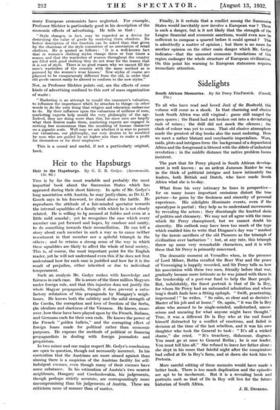Heir to the Hapsburgs
Tins is by far the most readable and probably the most impartial book about the Succession States which has appeared during their short history. In spite of Mr. Gedye's long association with Austria, he may justly claim, as Dr. G. P. Gooch says in his foreword, to stand above the battle. He reproduces the attitude of a fair-minded spectator towards the internal squabbles of a family with which he is not closely related. He is willing to be amused at foibles and even at a little mild scandal ; yet he recognizes the case which every member can put forward and hopes, by candour and sanity, to do something towards their reconciliation. He can tell a story about each member in such a way as to cause neither resentment in that member nor a spiteful triumph in the others ; and he retains a strong sense- of the way in which these squabbles are likely to affect the whole of local society. This is, of course, the most important point for the English reader, yet he will not understand even this if he does not first understand how far each case is justified and how far it is the result of prejudice, either inherited or due to individual temperament.
Such an analysis Mr. Gedye makes with knowledge and fairness in each case. He is aware of the three million Magyars under foreign rule, and that this injustice does not justify the whole Magyar propaganda, though it does prevent a satis- factory refutation of this propaganda by Hungary's neigh- bours. He knows both the subtlety and the solid strength of the Czechs, the corruption and love of freedom of the Serbs, the idealism and slackness of the Viennese. He knows, more- over, how these have been played upon by the French, Italians, and Germans each for their own ends. He knows the power of the French " golden bullets," and the corrupting effect of foreign loans made for political rather than economic purposes. He exposes the methods of political or financial propagandists in dealing with foreign journalists and proprietors.
In two minor and one major respect Mr. Gedye's conclusions are open to question, though not necessarily incorrect. In his contention that the Austrians are more sinned against than sinning there is a suspicion of the Austrian facility for self- indulgent excuses, even though many of their excuses have some substance. In his estimation of Austria's two nearest neighbours, Hungary and Czechoslovakia, his judgements, though perhaps strictly accurate, are correspondingly more uncompromising than his judgements of Austria, These are criticisms more of manner than of matter. Finally, is it certain that a conflict among the Succession States would inevitably now involve a European war ? There is such a danger, but is it not likely that the strength of the League financial and economic sanctions, would even now be sufficient to compose a quarrel before it could spread ? This is admittedly a matter of opinion ; but there is no room for another opinion on the other main danger which Mr. Gedye indicates—that the unsound economic foundations of this region endanger the whole structure of European civilization. On this point his warning to European statesmen requires immediate attention.






























 Previous page
Previous page